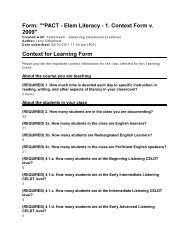The Tutoring Book - California State University, Sacramento
The Tutoring Book - California State University, Sacramento
The Tutoring Book - California State University, Sacramento
Create successful ePaper yourself
Turn your PDF publications into a flip-book with our unique Google optimized e-Paper software.
Social Constructivism in Action<br />
145<br />
Leslie Anglesey<br />
Spring 2011<br />
For some tutors new to the <strong>University</strong> Reading and Writing Center, the readings on the theoretical<br />
underpinnings for the Center can be a bit daunting. While some of the articles may sound interesting,<br />
even something we may agree with, it can be difficult to find a translation from theory to practice. In<br />
other words, some may find themselves agreeing with the tenets of one theory or another, but leave the<br />
classroom thinking: that’s nice, but what do I do with this? My goal is to help new tutors see possibilities<br />
of how theory can translate into practice.<br />
Social constructivism is built upon the idea that knowledge is created through the process of<br />
interaction between several individuals. No wonder this theory is applied to writing centers! Where else<br />
on campus can you find so many individuals collaborating toward a mutual understanding of a text?<br />
Tutors and student writers are constantly in dialogue toward a negotiated meaning of writing prompts,<br />
student writing, instructor feedback, and the readings students respond to in their classes. Andrea<br />
Lunsford tells us that collaboration is paramount in our understanding of this theory, and that the<br />
movement toward collaboration involves a shift “from viewing knowledge and reality as things exterior to<br />
or outside of us, as immediately accessible, individually knowable, measurable, and shareable—to<br />
viewing knowledge and reality as mediated by or constructed through language in social use, as socially<br />
constructed, contextualized” (48). What does this mean? This definition might be expressed differently as<br />
an equation:<br />
collaboration + context � knowledge<br />
According to social constructivists, knowledge is not a static, singular object, but a nebulous<br />
thing always in flux, always being created, added to, deleted from, and transformed through our<br />
interaction with others. Feeling more confused? Hopefully not, but in the next section I’ll show a small<br />
vignette from a tutoring session that will hopefully help to explain how this might occur in the Center.<br />
Social Constructivism in Practice: A Vignette<br />
One example of social constructivism in the writing center can be seen in a recent session with<br />
Joel i , one of my regularly scheduled student writers. Joel needed help understanding Lord Byron’s poem<br />
Prometheus, one of the readings that had been assigned in his history class. Joel had (half jokingly) asked<br />
if I could just tell him the meaning of the poem, assuming that all English majors are well versed in Lord<br />
Byron. Rather than dispense an analysis of the poem (which would reinforce the early model of the<br />
writing center as a Storehouse of Knowledge, and this model’s inherent hierarchy of power), we began to<br />
negotiate the meaning of the poem through several practices that reinforce social constructivist theory.<br />
After reading the poem several times over (both silently and aloud), we both began to dig out bits of<br />
meaning of the poem. When Joel was stuck on a word, we turned to the dictionary, looked up the<br />
definition and wrote it in the margins of Joel’s text. From there, they began to work out their own<br />
meaning through collaboration. For example, when we reached the line “What was thy pity’s<br />
recompense?” we both began to discuss the difficulty with the language, replace the difficult words (pity<br />
and recompense) with the phrases and definitions that had been negotiated through the use of the<br />
dictionary, through our conversation, our own analogies and examples, and finally started to reconstruct<br />
the sentence. <strong>The</strong> sentence transformed into a less eloquent, but more understandable question: “What did<br />
Prometheus get in return for feeling bad for humans?”

















